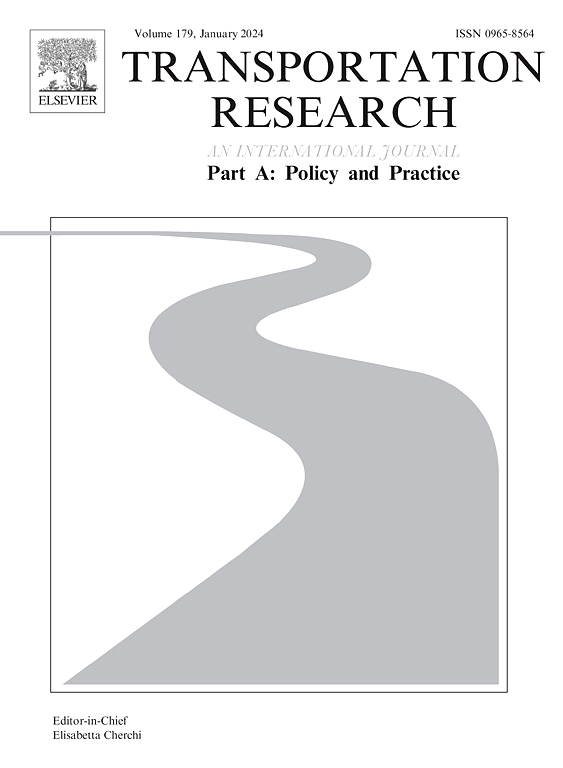Paying as you fly: Investigating air passengers’ preferences for voluntary carbon offset in Taiwan via the integrated choice and latent variable (ICLV) model
IF 6.8
1区 工程技术
Q1 ECONOMICS
Transportation Research Part A-Policy and Practice
Pub Date : 2025-09-23
DOI:10.1016/j.tra.2025.104693
引用次数: 0
Abstract
Carbon offsets allow individuals to take responsibility for their carbon footprint by participating in emission-mitigation projects. The current low level of participation in voluntary carbon offsets calls for a deeper understanding of air passengers’ preferences for voluntary carbon offset schemes. Since the cobenefits of carbon offsets might encourage scheme participation, this study uses an integrated choice and latent variable model to investigate air passengers’ preferences for carbon offset schemes with cobenefits for business and tourism purposes. A sample of 339 responses collected via a stated preference survey is used for choice model estimation. The results reveal that scheme attributes can increase participation propensity, including three cobenefits (species extinction reduction, air pollution reduction, and premature death reduction), scheme costs, and government certification. The positive effect of attitudes toward carbon offsets on scheme participation is significant for tourism travelers. However, attitudes and altruism do not influence the scheme participation of business travelers. Business travelers’ willingness-to-pay values for scheme attributes are greater than those of tourism travelers. Discussions and empirical implications are provided for the development of voluntary carbon offsets.
随飞随付:利用综合选择与潜变量(ICLV)模型,调查台湾航空旅客自愿碳补偿的偏好
碳补偿允许个人通过参与减排项目来为自己的碳足迹承担责任。目前自愿碳抵消的参与水平较低,需要更深入地了解航空乘客对自愿碳抵消计划的偏好。由于碳抵消的协同效益可能会鼓励计划参与,本研究使用综合选择和潜在变量模型来调查航空乘客对商业和旅游目的的协同效益碳抵消计划的偏好。通过陈述偏好调查收集的339个回答样本用于选择模型估计。结果表明,减少物种灭绝、减少空气污染和减少过早死亡的三个协同效益、方案成本和政府认证对参与倾向有促进作用。旅游游客对碳补偿的态度对计划参与有显著的正向影响。然而,态度和利他主义并不影响商务旅行者的计划参与。商务旅行者对方案属性的支付意愿值大于旅游旅行者。为自愿碳补偿的发展提供了讨论和实证启示。
本文章由计算机程序翻译,如有差异,请以英文原文为准。
求助全文
约1分钟内获得全文
求助全文
来源期刊
CiteScore
13.20
自引率
7.80%
发文量
257
审稿时长
9.8 months
期刊介绍:
Transportation Research: Part A contains papers of general interest in all passenger and freight transportation modes: policy analysis, formulation and evaluation; planning; interaction with the political, socioeconomic and physical environment; design, management and evaluation of transportation systems. Topics are approached from any discipline or perspective: economics, engineering, sociology, psychology, etc. Case studies, survey and expository papers are included, as are articles which contribute to unification of the field, or to an understanding of the comparative aspects of different systems. Papers which assess the scope for technological innovation within a social or political framework are also published. The journal is international, and places equal emphasis on the problems of industrialized and non-industrialized regions.
Part A''s aims and scope are complementary to Transportation Research Part B: Methodological, Part C: Emerging Technologies and Part D: Transport and Environment. Part E: Logistics and Transportation Review. Part F: Traffic Psychology and Behaviour. The complete set forms the most cohesive and comprehensive reference of current research in transportation science.

 求助内容:
求助内容: 应助结果提醒方式:
应助结果提醒方式:


